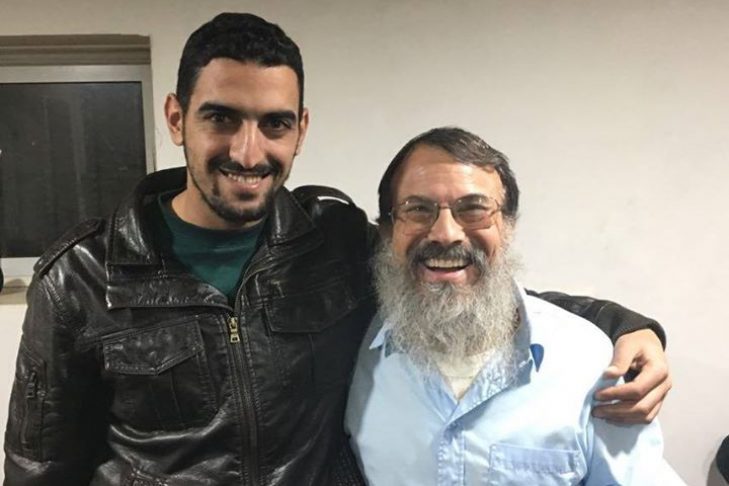Rabbi Hanan Schlesinger and Shadi Abu Awwad were not meant to be friends. The West Bank settler and the young Palestinian activist were intentional enemies, living alongside each other in willful denial of the other’s existence. However, the very thing that drove them apart—a claim and stake in the most contested piece of real estate in the world—eventually brought them together. They are perhaps the unlikeliest peace activists in Israel/Palestine. They lead an organization called Roots—Shorashim in Hebrew and Judur in Arabic. It’s a grassroots effort that fosters understanding, nonviolence and transformation between Israelis and Palestinians.
Last week, sponsored by CJP and Jewish Community Relations Council, the two men appeared together at Temple Emanuel in Newton. They told a packed audience that they advocated for peace by building empathy and trust through open conversations that take place in a Merkaz Karama, or Dignity Center. The center sits on contested territory in the heart of the West Bank. Schlesinger said that when people meet at the Merkaz, “A wash of liberation comes over them. They shake hands to get beyond the fear, the hatred and the stereotype, and people undergo transformation.”
Abu Awwad shared that his transformation has been a multi-year process. As a teenager, an Israeli soldier killed his uncle, and the tragedy stoked a burning hatred in him for all Israelis. However, when an Israeli doctor saved his brother’s life, he said, “I could not ignore the truth that this doctor saved my brother. I will always show respect, love and loyalty to her.”
Despite his gratitude to the Israeli doctor, Abu Awwad was still hesitant to go to a peace meeting. He noted he was the last of his family to join a peace movement. Roots, he said, has given him a “taste of life, but when I go to my village, there is still the fear, a soldier with a gun and my people calling me a traitor.” Abu Awwad decided to transcend those hardships and eventually became Roots’ director of youth. In that leadership role, he’s particularly keen to bring together 16- to 18-year-old Palestinians and Israelis. “It’s important for my side to meet Israelis before they go to the army and hold a gun,” he said.
For his part, Schlesinger said the most significant impact in getting to know his Palestinian neighbors as people has been internal. “My identity changed five years ago, the day I met a Palestinian,” he said. “Before that, I was blind.” That blindness was bound up in what he described as “the hubris of exclusivity. We belong here; they don’t. Both sides construct their identities with the nullification of the other side.”
The point was brought home to Schlesinger when he drove a pastor friend from Texas around the settlements. On their ride, Schlesinger picked up a hitchhiker and then another hitchhiker. He recalled the pastor commented on how open and friendly Schlesinger was. He told his friend: “Everyone here trusts each other. We have a common interest. By the time I finished that sentence, I had realized I was lying to my friend and to myself. I suddenly understood that I only picked up Israelis. I didn’t pick up Palestinians because I didn’t see them as human beings. Something was rotten inside, and that was the day I started my journey to meet my neighbors.”
Difficult insights like Schlesinger’s are addressed directly at Roots. Schlesinger noted that when both sides come together, “We don’t tell people who they are. We know we have to listen and let them tell us who they are. There are two truths in this land. Two peoples. It’s hard to say that, but we have to go beyond the hubris of exclusivity to find room in our hearts for these two truths.”
Although Schlesinger and Abu Awwad have not abandoned their hope for staying in the West Bank, they acknowledge that compromise and, ultimately, peace, will not necessarily come from a political solution. “Politicians won’t solve this conflict,” asserted Abu Awwad. “They’ve had 70 years. We need to stop looking at people as Palestinian or Israeli and see a human being.”
As for an actual peace plan, Schlesinger and Abu Awwad said a starting point is to accept that the land belongs to Israelis and Palestinians. Schlesinger explained that the goal is not two states or one state. “We want a land for all,” he said. “There have to be states, but they have to be intertwined and interdependent. That requires open borders without checkpoints.” He also called for an open residency program in which Palestinian refugees can live in Israel as Palestinian citizens, and Israeli citizens can settle in Palestine. Each state would have its own parliaments, which would help in establishing individual nations and identities.
Both men are optimistic that the plan can work, but Abu Awwad said both sides still need time to change. “People refuse to see each other, talk to each other,” he said. “The solution will come from people facing each other. We’re not ready for a peace solution yet. We have to first solve our conflict.”
Schlesinger says his 8-year-old granddaughter, a participant in Roots’ summer camp, is growing up without hate. “We’ve shattered the hard, callous shell of the hubris of exclusivity,” he said. “As the Mishnah implies, we’re not incumbent to complete this work, but neither can we excuse ourselves from the possibility of taking the first step.”



